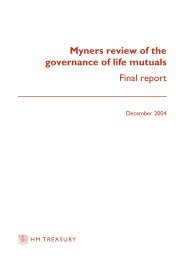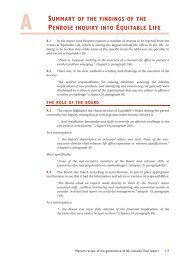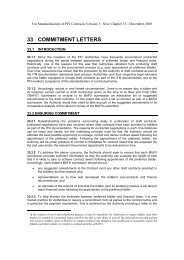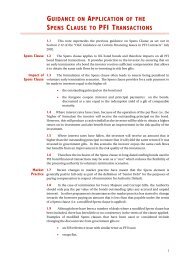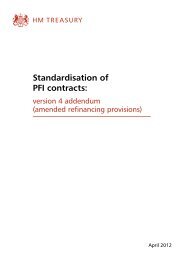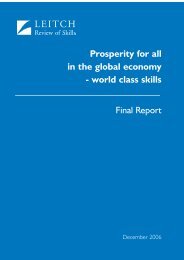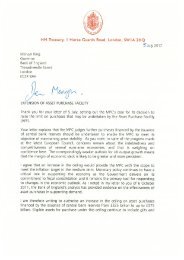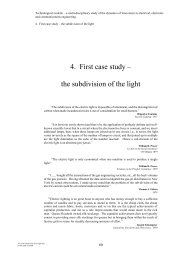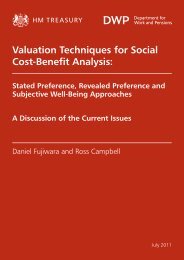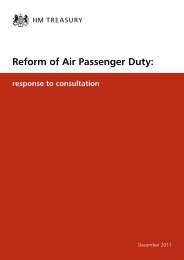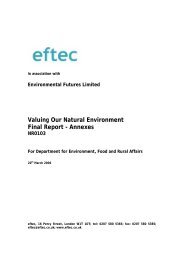NAO Good Practice Guide - Tackling external fraud - HM Treasury
NAO Good Practice Guide - Tackling external fraud - HM Treasury
NAO Good Practice Guide - Tackling external fraud - HM Treasury
Create successful ePaper yourself
Turn your PDF publications into a flip-book with our unique Google optimized e-Paper software.
<strong>Good</strong> practice in tackling <strong>external</strong> <strong>fraud</strong> | Deterring and preventing <strong>external</strong> <strong>fraud</strong><br />
The approach used by the Department<br />
for Work and Pensions<br />
The campaign has run in several phases,<br />
each with a different message and using<br />
different communication media. This<br />
aims to:<br />
l reinforce honest behaviour<br />
by customers;<br />
l create a climate of intolerance to<br />
benefit <strong>fraud</strong> among the wider public<br />
and undermine its social acceptability;<br />
l deter potential <strong>fraud</strong>sters.<br />
2.3 Departments have used a variety of methods<br />
to publicise the success of their work, such as<br />
issuing press releases and putting information<br />
on their websites of cases prosecuted. These<br />
are cost effective actions which can be used by<br />
smaller departments and agencies. In the United<br />
States of America the Internal Revenue Service<br />
issues periodic “Tax Fraud Alerts” on their website<br />
warning the public of the risks and costs of buying<br />
into tax evasion schemes, as well as providing<br />
information on the latest “schemes, scams and<br />
cons”. The Alerts set out in more detail the main<br />
From September 2001, the campaign<br />
focused on dishonest claimants.<br />
Messages of deterrence and detection<br />
aimed to raise the fear of getting caught<br />
and portray the likely consequences.<br />
Scenarios used in television<br />
advertisements showed benefit <strong>fraud</strong>sters<br />
being caught or punished, or both. In<br />
addition, the campaign used radio and<br />
regional press advertisements, the latter<br />
featuring real newspaper headlines from<br />
<strong>fraud</strong> prosecutions.<br />
In June 2003, the next phase used the<br />
slogan “We’re on to you”. It featured<br />
a spotlight that followed <strong>fraud</strong>sters in<br />
realistic scenarios, such as at work, to<br />
show them that they would be found out if<br />
they were continuing to claim benefits to<br />
which they were no longer entitled, and to<br />
warn potential cheats that benefit <strong>fraud</strong> is<br />
a serious crime.<br />
In August 2003, a new phase used<br />
small posters on lampposts and in pub<br />
washrooms. Aiming to look like an offer<br />
of cash in hand work, the message stated<br />
that continuing to claim benefits while<br />
working was benefit <strong>fraud</strong> and would only<br />
earn the person a criminal record.<br />
In November 2003, this phase was<br />
adapted. Small mock advertisements were<br />
placed in pubs, clubs and shop windows.<br />
The main message “Do you want to earn<br />
£££s and still sign on?” was designed to<br />
catch the eye of those considering cash<br />
in hand work, while continuing to claim<br />
benefits, to fund Christmas celebrations,<br />
and then to deter them from failing to<br />
report to the Department that they were<br />
now working.<br />
In 2006, the Department started it’s “No<br />
ifs, no buts” phase of the campaign. This<br />
phase focuses on the benefit <strong>fraud</strong>ster<br />
and targets their views that there may<br />
be excuses for committing benefit <strong>fraud</strong><br />
which the campaign seeks to overturn.<br />
“No if, no buts” has been used in<br />
television and poster advertising, in<br />
local press and magazines, buses,<br />
and door drops, as well as on the<br />
Department’s website.<br />
The Department arranges for independent<br />
evaluations of each phase of its<br />
campaigns. Research for the Department<br />
suggests that between 2005 and 2006<br />
there was an increase from 75 per cent to<br />
83 per cent of people who strongly agree<br />
that it is wrong to claim benefits to which<br />
they are not entitled.<br />
strands of the Service’s enforcement programme<br />
and the consequences of non compliance. For<br />
example, for employment taxes, the relevant “Tax<br />
Fraud Alert” provides details of legal requirements,<br />
employer and employee responsibilities, examples<br />
of tax evasion schemes, and data on how noncompliance<br />
has been dealt with in the courts<br />
including specific significant examples. To<br />
strengthen their message, some departments<br />
have used media campaigns (Figure 16). Before<br />
introducing a national campaign, pilots can be<br />
used to test and improve the likely effectiveness.<br />
Figure 16<br />
Examples of Departmental campaigns to change public attitudes and to deter <strong>fraud</strong>sters<br />
The approach used by <strong>HM</strong> Revenue&<br />
Customs to encourage self-employed<br />
people to register for tax<br />
<strong>HM</strong> Revenue & Customs ran a series of<br />
advertising campaigns at a cost of £2<br />
million specifically to raise awareness<br />
amongst the self-employed to register<br />
for tax. It ran three advertising campaigns<br />
during the period June 2005 to March<br />
2007. One of the main messages was<br />
“it is a simple process to register and<br />
we are there to help, ring our helpline”.<br />
The advertising campaigns focused on<br />
particular groups who may have failed<br />
to register for tax such as e-traders<br />
and landlords.<br />
The initial campaign costing £1.5 million<br />
resulted in:<br />
l An estimated additional 5,000 people<br />
calling the helpline to register. These are<br />
people who may have otherwise joined<br />
or remained in the hidden economy.<br />
<strong>HM</strong> Revenue & Customs estimates<br />
that it will collect £23 million in tax over<br />
three years from these people;<br />
l A further 3,300 people called the<br />
helpline to request the “Thinking of<br />
working for yourself?” and if these<br />
people register <strong>HM</strong> Revenue &<br />
Customs would collect an estimated<br />
£15 million in tax over three years.



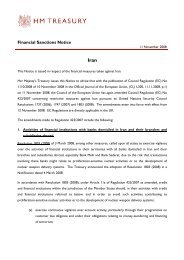
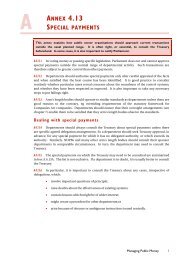
![AIRTO [Professor Dr Brian Blunden] - HM Treasury](https://img.yumpu.com/15492848/1/184x260/airto-professor-dr-brian-blunden-hm-treasury.jpg?quality=85)
